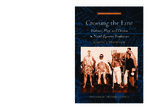Crossing the Line
Violence, Play, and Drama in Naval Equator Traditions
Abstract
For centuries, new sailors from European and North American countries have embraced often brutal hazing in an elaborate ceremony at sea called 'crossing the line' (British-American) and 'Neptunusfeest' (Dutch). Typically enacted upon crossing the equator, the beatings, dunks, sexual play, mock baptisms, mythological dramas, crude shavings and haircuts, and drinking and swallowing displays have attracted a number of protests and even bans as well as staunch defenses and fond reminiscences. The custom has especially drawn criticism since the late twentieth century with the integration of women into the military and the questioning of its hierarchical codes of manliness. In this study, the persistent ceremony's changing meaning into the twenty-first century is examined with considerations of development, structure, symbolism, performance, and function. A timely study revising previous assumptions about the custom's origins, diffusion, and functions. Al sinds de 16e eeuw worden zeelieden uit Europa en Noord- Amerika geconfronteerd met een meedogenloze en ingewikkelde ontgroeningsceremonie op zee. Het ritueel,'crossing the line' of Neptunusfeest, wordt voltrokken wanneer zeelieden voor het eerst op zee de evenaar passeren. De ceremonie gaat gepaard met verbaal en fysiek geweld, (kaal) scheren of knippen, onderdompelen en kielhalen, een seksueel getint rollenspel, spot-dopen,mythologische voorstellingen en alcoholgebruik. De omstreden ceremonie wordt de laatste decennia steeds vaker bekritiseerd in verband met de integratie van vrouwen binnen de marine en de met het gebruik verbonden hiërarchische codes van mannelijkheid. In deze studie worden de veranderende betekenissen van het gebruik geanalyseerd en wordt gekeken naar ontwikkeling, structuur, symboliek, performance en functies. Op basis van deze analyse biedt Bronner een nieuwe interpretatie over de herkomst, de verspreiding en de functies van het gebruik en wijst hij op de implicaties zowel ten aanzien van de ethische aspecten als van de genderverhoudingen in de postmoderne samenleving.
Keywords
culture and history; vrouwenstudies; anthropologie; women: historical, geographic, persons treatment; cultuur and geschiedenis; anthropologyDOI
10.5117/9789053569146ISBN
9789053569146OCN
298788498Publisher
Amsterdam University PressPublisher website
https://www.aup.nl/Publication date and place
2006Series
Meertens Ethnology Cahiers, MEL 2Classification
History
Society and culture: general
Sociology and anthropology


 Download
Download